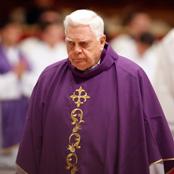Daily Best
May 12, 2010
http://www.thedailybeast.com/blogs-and-stories/2010-05-11/the-cardinal-who-got-away/?cid=hp:mainpromo6
As the pope accepts blame for the sex abuse scandals, Bernard Law, the disgraced former Archbishop of Boston, lives large in Rome. Barbie Latza Nadeau the Vatican's shameful leniency.
Pope Benedict XVI began his four-day mea culpa tour in Portugal this week, but back in Rome, Bernard Francis Cardinal Law remains very much a man about town. When he's not preaching to the faithful at the majestic patriarchal basilica of Saint Mary Major, the disgraced Archbishop emeritus of Boston is dashing to curial meetings across town in Vatican City. On Sunday afternoons, he is often spotted at the Cecilia Metella restaurant on the Appia Antica where they know his Eminence Law's favorite dishes by heart. During the week, he frequents the restaurants along the Borgo Pio outside St. Peter's square, talking shop over dinner with the Vatican elite.
 |
Cardinal Law is very much the poster priest for the sex abuse scandal that is rocking the Roman Catholic Church right now. He resigned in 2002 after admitting he did nothing to stop the rampant sexual abuse in the Boston diocese. But rather than hiding away in a dark monastery to repent, Cardinal Law is instead an exalted member of Vatican inner circles. He was one of nine chosen prelates to preside over the funeral of John Paul II in 2005 and he is still a voting member of the College of Cardinals. He is also a member of six important Vatican congregations—including the Congregation for the Clergy and the Congregation for Catholic Education—and a member of the Pontifical Council for the Family, the Vatican's policymakers for Catholic families on issues like marriage preparation and birth control.
Benedict XVI admitted to journalists on the papal plane that the sex abuse scandal was "truly terrifying."
Cardinal Law effectively took a bullet for the American Catholic Church during the height of the sex scandal in the early 2000s. By resigning in shame for his mishandling of predator priests, he took the heat off Vatican higher-ups, including then Cardinal Joseph Ratzinger, now Benedict XVI. Instead of turning the priests in to civil authorities or defrocking them, Law shuffled them around his 2.1 million-strong dioceses, sending vague memos to Rome about what was going on, and admitting the abuse problem only when a legal claim had to be paid. He used an underground railroad-style network that not only protected the offenders, but enabled them to carry on their abuse of thousands of children. Law's name started popping up on criminal depositions alleging that he had lied to authorities to cover for the abusers and the Boston dioceses' legal settlements with victims of abuse eventually topped $100 million. With no other option, Law tendered his resignation to Pope John Paul II and slinked off to Rome. (Cardinal Law declined to be interviewed for this article.)
Since Law's very public resignation in 2002, scores of high-ranking church officials have also stepped down from apex posts at the center of the burgeoning sex scandal. In 2010 alone, Pope Benedict XVI has accepted the resignations of four bishops in Ireland who admitted to involvement in covering up decades of physical and sexual abuse against Irish women and children. Bishops in Norway and Belgium have also resigned under similar circumstances. This week, the pope granted the resignation of Walter Mixa, the bishop of Augsburg from his native Germany. Mixa had earlier denied allegations that he physically abused children while he was a priest, but when a criminal investigation was launched last month, the German church essentially pushed him out, calling him a "burden" on the pope's homeland church.
Each high-profile resignation comes with the requisite mea culpa. The Vatican then touts the apologies as proof that Holy See is not responsible for what happens in the local dioceses. (Though Benedict XVI admitted to journalists on the papal plane that the sex abuse scandal was "truly terrifying.") When Law, who is still wanted for questioning by the grand jury in Boston, resigned, he apologized through a written statement: "To all those who have suffered from my shortcomings and mistakes, I both apologize and from them beg forgiveness." Similarly phrased atonements have been echoed with each of the European resignations this year.
Like Cardinal Law, the European bishops who resign "for the good of the church" will likely do very little penance— indeed, most do not even leave the Church. None of the bishops who have admitted responsibility in the sex scandal cover-up will be defrocked. Many, including at least two of the Irish bishops, are expected to be given charge of titular churches in Rome. Others will continue to minister, teach theology or consult various congregations on church policy. Few Catholic leaders demand accountability. And when they try, as the Archbishop of Vienna Christoph Schonborn did this week when he accused the Vatican of covering up abuse, their criticism is ignored.
Abuse victims' groups say that rewarding the scorned bishops is proof that the Holy See is still conducting business as usual. David Clohessy, national director of Survivors Network for those Abused by Priests, told The Daily Beast that Law's continuing exalted status in the Vatican sends a strong, clear signal to church employees across the globe. "Conceal child sex crimes and you'll be protected or promoted by the hierarchy. It also sends an equally strong, clear signal to abuse victims: your pain doesn't matter to the church hierarchy," he says. "Given that he has enabled the sexual abuse of children, Law has no business being a priest, let alone a high ranking Catholic official."
Barbie Latza Nadeau, author of the Beast Book Angel Face, about Amanda Knox, has reported from Italy for Newsweek Magazine since 1997. She also writes for CNN Traveller, Budget Travel Magazine and Frommer's.
Any original material on these pages is copyright © BishopAccountability.org 2004. Reproduce freely with attribution.